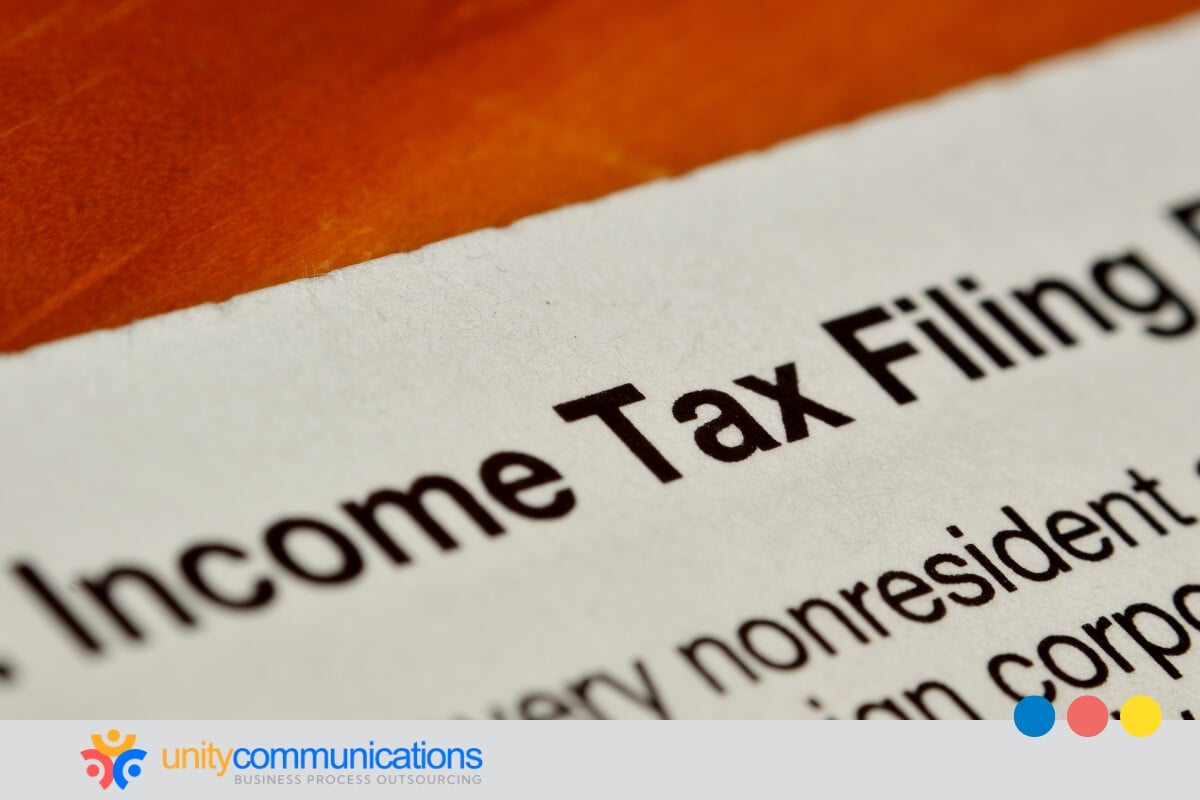Table of Contents
Tax preparation is crucial in real estate operations. It promotes compliance with laws, maximizes deductions, and minimizes the risk of costly penalties. However, real estate agents often need help understanding complex tax codes, keeping track of numerous transactions, and managing deadlines.
Business process outsourcing (BPO) firms can handle these tasks on behalf of real estate companies. Outsourcing vendors leverage their expertise and resources for seamless tax preparation.
Keep reading to learn how real estate BPO services streamline tax handling!
Understanding tax preparation outsourcing

Before delving into outsourced tax strategies, let’s first answer the question: What is BPO? It is a business practice wherein a company delegates a non-core function to an external service provider. Outsourcing encompasses many activities, from customer service and finance to human resources (HR) management and information technology (IT) support.
This is how outsourcing works for real estate tax preparation. The BPO provider utilizes its labor force, technologies, and workflows to streamline tax-related activities, such as:
- Income tax filings. The BPO company prepares and submits federal and state income tax returns. They correctly report income and expenses to maximize deductions, refunds, and credits.
- Property tax assessments. When real estate agencies outsource tax preparation, the service provider might also evaluate property values to determine the correct property tax amounts. The BPO team helps appeal assessments and avoid overpayment.
- Tax compliance. The BPO company ensures all tax-related activities adhere to federal, state, and local regulations. This process includes staying up-to-date with tax law changes and maintaining accurate records to avoid penalties.
The BPO provider might also deploy a real estate virtual assistant (VA) for additional support. But what is a real estate VA? They are remote experts who handle administrative tasks, such as managing tax documents and coordinating with tax professionals. Enhanced organization and faster task completion are some reasons to hire a real estate VA.
Benefits of real estate outsourcing for tax preparation
BPO in real estate tax preparation offers numerous advantages that can significantly enhance operations and performance. These include:
Cost savings
Real estate outsourcing for tax preparation reduces operating costs by eliminating the need to hire and train in-house tax experts, which can be expensive and time-consuming. Agencies can also avoid purchasing and maintaining tax software and pay only for the services they need, reducing overhead costs associated with a full-time tax department.
Accuracy and compliance
Outsourcing firms employ tax experts who value accuracy and compliance. These experienced professionals stay updated on the latest tax laws and regulations. BPO firms also use advanced software and meticulous processes to calculate taxes accurately, identify applicable deductions, and file correct forms promptly.
Focus on core business
Real estate outsourcing for tax preparation allows internal staff to prioritize core business activities by significantly reducing the administrative burden associated with tax management. This heightened focus allows real estate firms to improve client relations, boost property sales, and enhance portfolio management.
Scalability
BPO services can adapt to businesses’ varying needs. Whether the real estate agency manages a few properties or has an extensive portfolio, BPO companies can adjust their operations to keep tax preparation efficient, compliant, and accurate.
Working with a BPO company for tax filing offers significant advantages. However, selecting the right tax preparation outsourcing service is crucial to maximize these benefits.
Here is how to handle the process:
Choosing a real estate outsourcing partner for tax preparation

When selecting an outsourcing partner, real estate agencies must prioritize industry experience, a deep understanding of real estate tax laws, and robust technological capabilities. These qualities promote efficient and compliant service delivery.
- Industry experience. They should choose a partner with a proven track record in tax preparation for real estate professionals.
- Understanding of real estate tax laws. To avoid compliance issues, real estate agencies should find a provider who stays updated on local, state, and federal tax regulations that affect real estate transactions.
- Technological capabilities. They must assess the BPO company’s use of advanced software for accurate calculations, data security measures, and seamless integration with existing systems.
Steps to vet potential outsourcing partners
Real estate firms can select the right outsourcing partner with these steps:
- Check credentials. Real estate agencies can pick providers with affiliations to professional organizations and industry-specific certifications demonstrating expertise.
- Review client references. They must request and review client references or ask for a real estate case study, as these offer valuable insights into the provider’s reliability and service quality.
- Assess the technology stack. Real estate agents must evaluate the provider’s technological capabilities, including the software and tools they use for tax preparation. The right tech is accurate, efficient, and secure.
Challenges and considerations in outsourcing tax services

Outsourcing poses risks such as operational disruptions, data breaches, and communication barriers. These issues can delay tax processes, affecting timelines, client satisfaction, and trust.
Addressing these challenges fosters a smooth transition and a productive partnership, optimizing the benefits of outsourcing for real estate businesses.
- Data security. Real estate firms must determine whether the outsourcing partner has robust data security measures to protect sensitive client and financial information.
- Communication barriers. They need to address potential language or time zone differences affecting communication and collaboration.
- Integration with existing systems. Firms should seamlessly integrate the outsourcing partner’s processes and software with their current tech infrastructure to avoid disruptions and compatibility issues.
Other tips when considering real estate outsourcing for tax preparation include establishing confidentiality agreements to protect sensitive information, clarifying expectations through service-level agreements (SLAs) for accountability, and planning a structured transition process.
Lastly, real estate agencies must train staff, securely transfer data, and ensure seamless service continuity. These strategies can help minimize disruptions and maximize tax filing and management efficiency.
The bottom line
Real estate outsourcing for tax preparation offers strategic advantages, such as enhanced accuracy, guaranteed compliance with tax laws, significant cost savings, and improved operational efficiency.
Real estate companies should evaluate their current tax processes to identify areas where outsourcing can streamline operations and reduce costs. Let’s connect to Iearn how outsourcing can optimize your tax management strategies.




